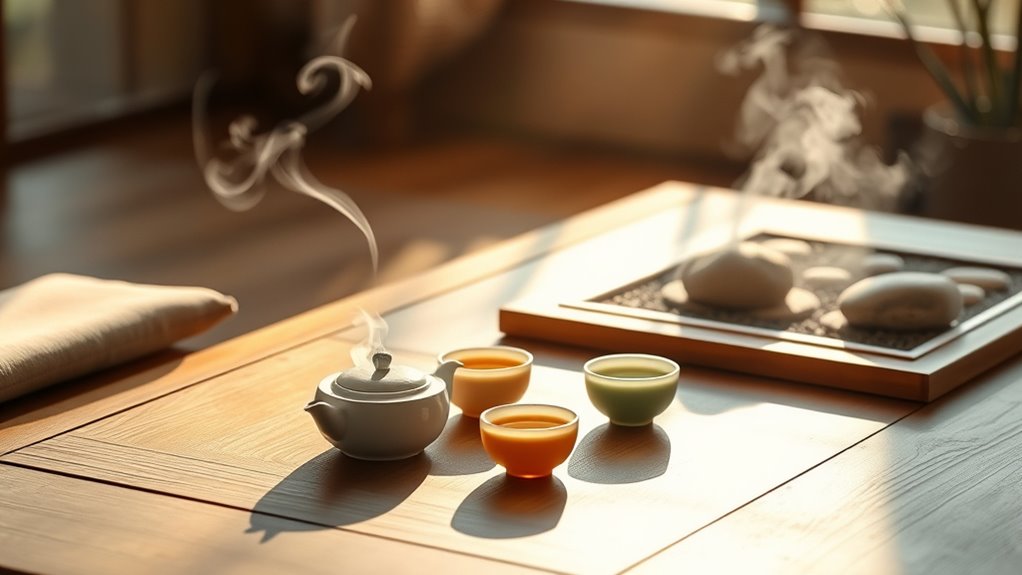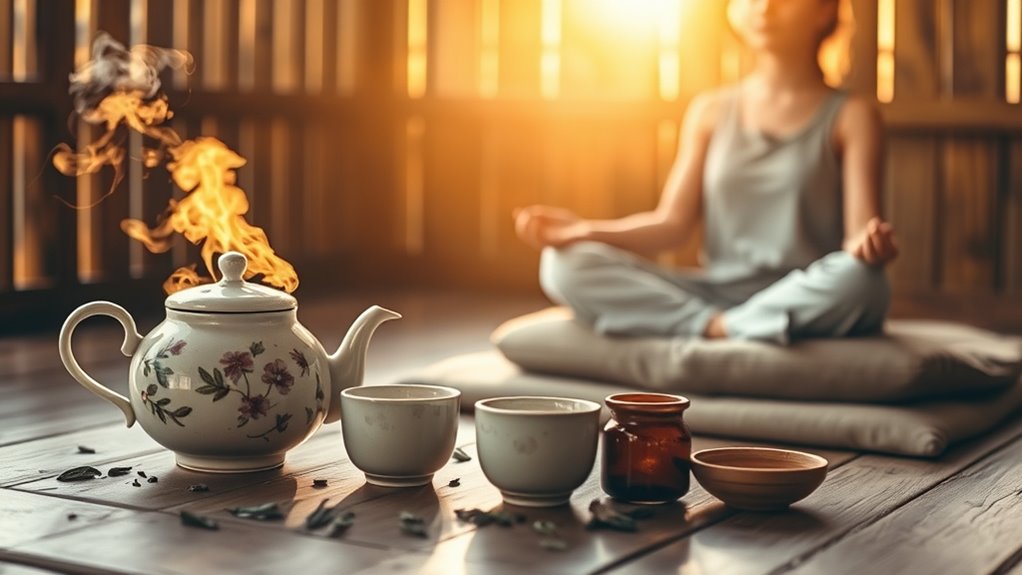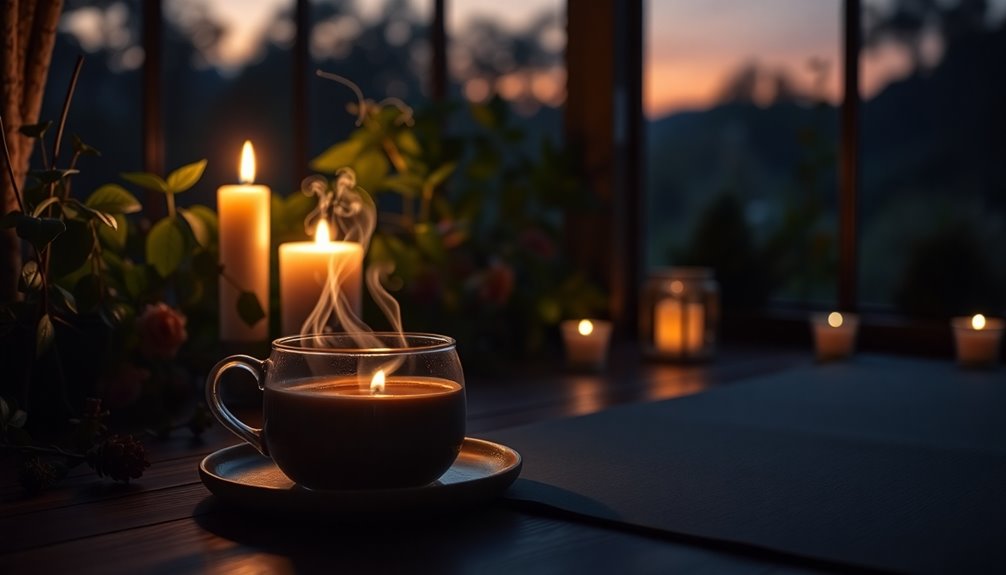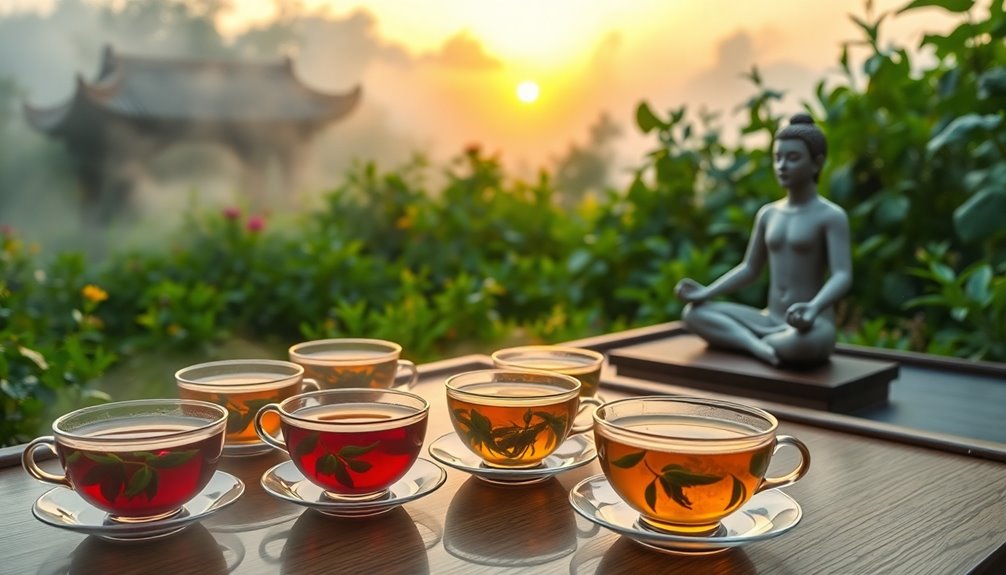To deepen focus during meditation, match energizing teas like green tea or matcha with active styles such as walking or mindfulness in motion, as their caffeine boosts alertness without jitters. For a more relaxed and reflective session, opt for calming herbal teas like chamomile or lavender, ideal for evening or seated meditation. Incorporating these teas into your routine enhances your mindfulness journey—discover how specific pairings can elevate your practice even further.
Key Takeaways
- Match herbal teas like chamomile or lavender with calming meditation styles to enhance relaxation and deepen focus.
- Pair green tea or matcha with active meditation or mindful movement for increased alertness and sustained attention.
- Use light green teas in morning sessions to promote gentle alertness and mental clarity.
- Incorporate herbal teas in evening meditation to facilitate winding down and inner tranquility.
- Integrate tea rituals into your practice to create a mindful transition, boosting concentration and immersion.

Imagine enhancing your meditation practice by pairing it with the right tea; the right combination can deepen your focus and promote relaxation. When you select a tea tailored to your meditation style, you’re not just sipping a beverage—you’re creating an environment that nurtures mindfulness enhancement and supports your mental clarity. Different teas influence your body and mind in unique ways, helping you achieve the desired meditative state more effortlessly.
Pairing the right tea with meditation deepens focus and promotes relaxation naturally.
If your goal is to cultivate calm and deepen mindfulness, consider teas like chamomile or lavender. These herbs are renowned for their soothing properties, which help quiet mental chatter and ease physical tension. By sipping a gentle herbal tea before sitting down, you set a tranquil tone, making it easier to concentrate and stay present. The calming effects promote mindfulness enhancement by encouraging you to observe your thoughts without judgment, fostering a sense of inner peace. Such teas also help you slow down, making your meditation more intentional and less distracted.
On the other hand, if you seek an energy-boosting effect to energize your practice, teas like green tea or matcha can be excellent choices. These teas contain natural caffeine and antioxidants that invigorate your mind without the jitters often associated with coffee. Drinking a cup before meditating can sharpen your focus and increase alertness, making it easier to stay engaged during longer sessions. The subtle energy boost from these teas supports a more active form of meditation, such as mindfulness in motion or walking meditation. The key is to consume them in moderation so you maintain a balanced energy level that helps you stay attentive without feeling overstimulated.
Matching your tea choice to your meditation style also involves considering timing and dosage. For instance, if you meditate in the morning, a light green tea can provide gentle alertness. If you prefer evening sessions, calming herbal teas help wind down and prepare your mind for restful sleep. The ritual of brewing and sipping your tea can become an integral part of your meditation, acting as a bridge to mindfulness or energization. It’s a tactile, sensory experience that grounds you in the present moment, amplifying the benefits of your meditation practice. Incorporating aesthetic home decor elements, such as a thoughtfully arranged tea set or calming wall organization, can further enhance your meditation environment and deepen your focus.
Frequently Asked Questions
Can Certain Teas Enhance Meditation Duration or Quality?
Certain teas can enhance your meditation by boosting focus and relaxation. Tea antioxidants like catechins help reduce stress, while herbal infusions such as chamomile or lavender promote calmness. Drinking these before meditation may extend your session and improve quality. You’ll feel more centered and alert, thanks to the soothing properties of herbal infusions. Experiment with different teas to find what best supports your meditation practice and deepens your focus.
Are There Teas Suitable for Beginners Versus Advanced Meditators?
Did you know that 60% of beginners find herbal teas more calming, making them perfect for starting meditation? For beginners, choose beginner-friendly blends like chamomile or peppermint, which promote relaxation without overwhelming your senses. Advanced meditators often enjoy more complex teas, such as matcha or pu-erh, suitable for advanced tea ceremonies, helping deepen focus. Your choice depends on your experience level and meditation goals.
How Do Caffeine Levels in Tea Affect Meditation Focus?
Caffeine in tea influences your meditation focus by affecting caffeine metabolism and alertness levels. If you’re sensitive to caffeine, high levels can cause jitters or disrupt your calm, making it harder to stay focused. On the other hand, moderate caffeine can boost alertness without overwhelming you. Pay attention to how your body responds, and choose teas with lower caffeine content if you want a more centered, peaceful meditation experience.
Can Herbal Teas Replace Traditional Teas in Meditation Routines?
You can definitely replace traditional teas with herbal remedies in your meditation routine. Herbal teas, like chamomile or mint, offer calming effects without caffeine, making them ideal for focus and relaxation. Use simple tea preparation techniques, such as steeping herbs in hot water for a few minutes, to create a soothing beverage. Incorporating herbal teas helps you maintain a peaceful mindset, enhancing your meditation experience naturally.
Are There Cultural Traditions Linking Specific Teas to Meditation Practices?
You might wonder if cultural traditions link specific teas to meditation. Many cultures have rich tea rituals rooted in their meditation history, like Japanese matcha ceremonies or Chinese gongfu tea practices. These cultural tea rituals often enhance mindfulness and focus during meditation. By understanding these traditions, you can deepen your practice and enjoy a meaningful connection to meditation’s historical roots, enriching your experience beyond just the physical act.
Conclusion
Just like the contrast between a calming herbal tea and a vigorous mindfulness session, pairing teas with meditation deepens your focus. The gentle warmth of chamomile complements a relaxed, restorative practice, while a sharp green tea energizes your active meditation. By thoughtfully matching flavors to styles, you create a harmonious balance that sharpens your mind and soothes your soul. Embrace these pairings, and discover how blending taste and technique transforms your meditation into a richer, more focused experience.










